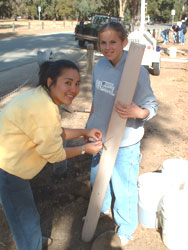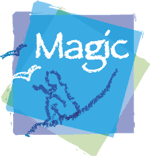Our Accomplishments

30 Years of Magic
People have come to Magic to clear heads of nonsense, and to fill hearts with love. Since 1979 We've been evolving to better discern and further common interests of humankind.
In the realm of idea we began with a mandate to study and teach human ecology. From the outset we were attentive to apparent conflicts between economic and ecological approaches to value. By the early 1980's we were teaching the first course in Ecological Economics to be offered at Stanford University. Over the next two decades we've developed the concept of valuescience and disseminated it through teaching, publishing, and demonstration projects.
We've shaped an all-volunteer organization and robust community of service. At the center of this community are residential service learning program participants who shoulder primary responsibility for operating Magic for benefit of the general public. Key operating personnel, board members, and other supporters include exceptionally talented and accomplished individuals with demonstrated commitment to furthering common good. A number have been associated with Magic for a decade or more.
We've generated an organizational structure and culture which reflect our mission, relying heavily upon gifts of material and labor, making fund-raising incidental to our service activities, and providing personnel freedom to learn and serve in ways suited to individual circumstance. We've built a modest asset base that includes three adjacent Palo Alto residences that Magic's service learning community occupies.
From this foundation of ideas, people, and other resources we've created programs to shed light on common human values and how people may effectively further them. With Magic programs we aim to provide opportunities for participants to cultivate individual health and awareness, promote social justice, peace, and freedom, and increase and protect wealth, including environmental quality.

Since 1979 we have:
- presented valuescience, an ecological approach to value, to more than 25,000 people
- taught sound health practices including values clarification and life-planning; swimming, cycling, and running; and science-based eating to more than 5,000 people
- provided instruction and mentoring to more than 1,000 youths
- founded and sustained a valuescience-based residential service learning community and an Evergreen Park Neighborhood Association which continue today
- participated in creating numerous other cooperative ventures (e.g. food buying co-ops, intentional communities, non-profit ventures, neighborhood renewal groups, childcare co-ops)
- mediated resolution of more than a thousand domestic, commercial, and neighborhood disputes, including community conflicts to which thousands of diverse individuals were parties
- salvaged 40,000 surplus fruit trees and distributed them to 20,000 children in the context of an integrated natural and social science curriculum we designed
- written mathematical models and computer software to simulate the ecological and economic impacts of urban tree management policies
- secured adoption of the first pavement shading standard for municipal street tree management
- organized, trained, and guided more than 4,000 volunteers from more than two dozen Bay Area cities and towns to plant more than 10,000 trees along streets, in parks, on home grounds, and on openspace lands
- redesigned and oversaw reconstruction of residential streets to divert tens of thousands of short-cutters out of neighborhoods and onto main roads
- rewritten and secured passage of sections of the Palo Alto Comprehensive Plan calling for safer neighborhood streets and for street tree planting, and organized residents to lobby successfully to limit additional building and paving in Palo Alto
- published research and demonstration project results in state, national, and international meetings, in lay and professional journals, and in proprietary monographs, many of which have been distributed worldwide.
On the basis of these achievements we have won national and international awards and recognition for assessing ecological impacts of climate change (International Oaks), swim instruction (New Zealand Triathlete), urban forest planning (Journal of Arboriculture), mediation and community development (American Society of Landscape Architects), habitat restoration (Audubon), transportation planning (Renew America), river-floodplain stewardship (BioScience), valuescience (Society for Ecological Restoration), and public service (Stanford University).
Although Magicians reflect with satisfaction upon the purposefulness and enthusiasm we've brought to our work, and although we are grateful for the appreciation others have shown for our accomplishments, we remain cautious in assessing our contribution to human well-being. We're aware of many instances where people celebrated results obtained over a few years or decades, only to later realize that adverse impacts outweighed gains.
We're grateful to the many people who've made Magic to date, and we look forward to continuing to grow the Magic community of service. If you think you may enjoy making Magic, we'll welcome your inquiry.

